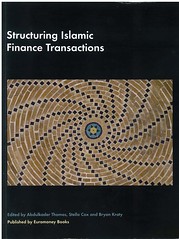
Structuring Islamic Finance Transactions
Originally uploaded by capitalandilec
Understand the core principles of Islamic finance instruments, their applications and structures, their placement in the context of modern financial developments and the growth of Islamic financial institutions.
This new book explains the fundamentals of Islamic finance product development and compliance with Islamic law. The expert authors lead you through the complex structures and applications of Islamic transactions in the modern financial environment, including those providing liquidity and risk management for Islamic financial institutions.
Case studies from experts around the globe are used to illustrate key findings. These include:
* Emirates Airlines – Musharaka sukuk issue for corporate financing
* Hanco/BSEC - ijara auto securitisation
* Ijara MALT(TM) - residential mortgage securitisation
* Global Telecoms – mudaraba syndication for revolving murabaha
* Tabreed – mixed asset (istisna'a, ijara) Sukuk issue for corporate financing
* Telekom Malaysia - syndicated lease
* Arabian Bottling – salam applied to corporate supply acquisition
* Saudi refinery - petrochemical plant expansion
* SKS Power - BOT power plant project financing
* ZamZam Towers – intifa'a, ijara derivative applied to real estate project financing
A must-read for all those engaged in Islamic finance and banking, those advising Islamic financial institutions, and every professional needing to understand the alternative structures available.
Topics covered include:
* Partnership models and equity finance vehicles
* Sales, leasing and asset-linked, debt-like transactions
* Structuring leases
* Pre-paid sales and their operation as futures contracts
* Manufacturing and working capital, and project finance arrangements including securitised and syndicated project finance deals
* Real estate finance applications
* Asset management products, indices and investment funds
* Sukuk and debt-like products, including structuring Islamic securitizations, rating Sukuk and legal and regulatory issues
* The development of the Islamic capital market, and the structures available for Islamic banks to manage liquidity
* Risk management and derivative-like products
* The emerging regulatory environment for Islamic finance products and transactions, and how the industry is responding to this.
Featuring contributions from:
* Commercial Bank of Qatar
* Dawnay Day
* Islamic Finance Consultants, Bahrain
* Taylor Wessing
* Lovells
* University Utama
"I wish that this had been the first book I read on Islamic finance." - David E. Upton, PhD, CFA®, AIF®, Virginia Commonwealth University
No comments:
Post a Comment